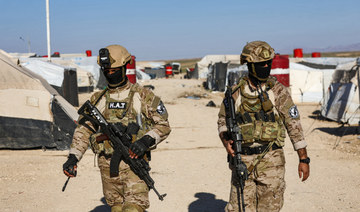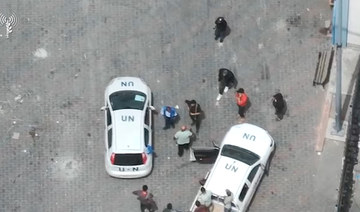HALABJA: In the Kurdish city of Halabja in northeastern Iraq, municipal director Kwestan Faraj recalls the day when being a woman saved her life.
Though equality may be a distant reality for many women in Iraq, in Halabja women have reached top levels of local government.
Mayor, university dean, director of the veterinary department, and health spokesperson are some of the senior posts held by women in the city of around 115,000 inhabitants.
It marks something of a departure for Iraqi Kurdistan, where public affairs have long been dominated by a handful of men. Tradition and conservative values have meant that women face routine discrimination and are largely confined to the private sphere.
“When you are a woman, climbing the ranks comes with a lot of sacrifices,” Faraj, 55, said.
A former deputy head of the municipality for 15 years, Faraj launched her political career many years earlier when as a student she handed out leaflets against Saddam Hussein’s regime, which carried out an infamous chemical attack on the city shortly before the end of the Iran-Iraq war in 1988.
She recalled one day when an armed man arrived demanding that she sign dubious paperwork. She refused.
“I thought he would pull out his gun and shoot,” she said.
“He got up and told me: ‘If you weren’t a woman, I know what I would have done’.”
She said that in her city the drive for gender equality was largely led by the Patriotic Union of Kurdistan (PUK), one of two historical parties in Iraqi Kurdistan.
Yet some residents complain that the advances are largely cosmetic and aimed at masking the shortcomings of public services.
A junior partner in the Kurdistan regional government in Irbil, the PUK holds the post of speaker in the regional parliament, which it also awarded to a woman, Rewaz Faiq.
The party “believes in equality between men and women in all domains,” Faraj said.
“This has allowed us to achieve gender balance in administrative posts in Halabja,” said the head of the municipality, who has held the post since 2016.
Halabja prides itself on having had a woman mayor, Adela Khanum, in the first decades of the 20th century. Now it has another, Nuxsha Nasih.
It also has Kurdistan’s first female university dean, Mahabad Kamil Abdullah. “The Islamist parties were among the first to congratulate me when I became the president of Halabja University,” she said.
But it is by no means representative of the situation of women in Kurdistan as a whole. A 2018 UN report found that women in the workforce represent barely 15 percent of the women of working age. About three quarters of those work in the public sector.
In Iraq’s Oct. 10 parliamentary election, more than 90 women were elected according to preliminary results, exceeding the minimum 83-seat quota established for women in the 329-seat chamber.
Though the Kurdistan region has cultivated an image of relative stability and tolerance, women’s rights activists say key issues like forced marriage and female genital mutilation have gone unaddressed.
“It is not enough to have women in high posts. There need to be more women in the lower ranks,” said Gulistan Ahmed, who heads the governmental commission for human rights in Halabja.
Many residents are more preoccupied with the failings of public services than with seeking gender equality.
“There have been no notable changes in the city under their mandate, whether at the level of public services or with the launch of new projects,” complained Wshyar Abdulkarim, a 45-year-old spice merchant.
Female market trader Mujda Ahmed said having women in top jobs had yet to lead to an improvement in services for women.
“I have worked in the market for six years and not a single person has built public toilets for women,” she said.
“I have the impression that they are being used by their parties, which simply want to improve their image on the issue of equality, nothing more.”
In Iraqi Kurdish city, women gain power without parity
https://arab.news/vb4v2
In Iraqi Kurdish city, women gain power without parity

Egypt warns against consequences of Israeli escalation in Gaza

- During talks with Ayman Al-Safadi and Fuad Hussein, FM Shoukry said that there would be negative repercussions for regional stability if Israel continued to escalate its activities in Gaza
- Discussions in Manama took place on the sidelines of an Arabian foreign ministers’ meeting being held in preparation for the Arab Summit
CAIRO: Egypt’s Foreign Minister Sameh Shoukry has warned of dire consequences as a result of Israel escalating its activities in the Gaza Strip.
During talks with his Jordanian and Iraqi counterparts, Ayman Al-Safadi and Fuad Hussein, he also said there would be negative repercussions for the security and stability of the whole region.
The discussion in Manama on Wednesday took place on the sidelines of an Arabian foreign ministers’ meeting being held in preparation for the Arab Summit.
Shoukry talked about Egypt’s efforts to reach an immediate, comprehensive and lasting ceasefire in Gaza and its call for allowing immediate delivery of humanitarian aid.
He also stressed his country’s categorical rejection of any attempts to displace Gazans or kill the Palestinian cause.
He underlined the need to stop targeting civilians, halt Israeli settler violence, and allow aid access in adequate quantities “that meet the needs of our Palestinian brothers.”
During the meeting, Shoukry also reaffirmed Cairo’s support for the stability of Iraq and Jordan and emphasized the importance of implementing directives from the three countries’ leaders to boost cooperation within the framework of the tripartite mechanism.
He said Egypt viewed tripartite cooperation as a way to link the interests of the three countries and maximize common benefits. The discussion also underlined the importance of putting into effect agreed joint projects as soon as possible.
During a separate meeting with Iraqi minister Hussein, Shoukry reiterated the directives of President Abdel Fattah El-Sisi to develop relations between the two countries in various fields.
The Iraqi minister highlighted close historical ties with Egypt that required continued coordination on the various challenges plaguing the region. Hussein also hailed the key role played by Egypt to bring about an end to the crisis in Gaza.
Houthis claim 2 attacks on ships in Red Sea

- Houthi military spokesman Yahya Sarea said that the militia’s naval forces launched an “accurate” missile strike on the US Navy destroyer USS Mason in the Red Sea
- Statement comes a day after US Central Command said that the USS Mason shot down an incoming anti-ship ballistic missile launched by the Houthis
AL-MUKALLA: Yemen’s Houthi militia claimed responsibility on Wednesday for two drone and missile attacks on a US warship and a commercial ship in the Red Sea, vowing to continue striking ships in international seas, mostly near Yemen’s borders, in support of Palestinians.
In a televised broadcast, Houthi military spokesman Yahya Sarea said that the militia’s naval forces launched an “accurate” missile strike on the US Navy destroyer USS Mason in the Red Sea, as well as a combined attack on the Destiny in the Red Sea. Sarea did not specify when Houthis forces assaulted the two ships, or if the militia caused any human casualties or damage. The statement comes a day after US Central Command said that the USS Mason shot down an incoming anti-ship ballistic missile launched by the Houthis from areas under militia control in Yemen on Monday evening.
According to marinetraffic.com, which provides information on ship locations and identities, the Destiny is a Liberian-flagged bulk carrier that left Bangladesh’s Port of Chittagong on March 31 and landed at the Saudi Red Sea port of Jeddah on April 17. The Houthis said they attacked the ship when it reached Israel’s Eilat on April 20, defying militia warnings to ships sailing the Red Sea to avoid the port.
The Houthis have sunk one ship, seized another and launched hundreds of ballistic missiles, drones, and explosive-laden drone boats at International commercial and naval ships in the Gulf of Aden, the Red Sea, and, more recently, the Indian Ocean. The militia claimed its strikes were intended to push Israel to cease its blockade of the Gaza Strip, and that they targeted US and UK ships after the two nations blasted Houthi-controlled regions of Yemen.
On Tuesday, Houthi media said that jets from the US and the UK had launched four strikes on Hodeidah airport in the Red Sea city, the second round of airstrikes on the same airport this week. The US and UK replied to the Houthi Red Sea campaign by unleashing hundreds of airstrikes on Sanaa, Saada, Hodeidah and other Houthi-controlled Yemeni regions. According to the two nations, the strikes prevented many Houthi missile, drone, or drone boat assaults on ships in international seas while significantly weakening Houthi military capabilities.
The US-led Combined Maritime Forces said on Tuesday that Lebanon and Albania joined the international marine coalition as the 44th and 45th members, respectively. “It is a pleasure to welcome both Lebanon and Albania to the Combined Maritime Forces,” US Navy Vice Admiral George Wikoff, the CMF commander, said in a statement. The Bahrain-based CMF is made up of five task teams that protect major maritime waterways such as the Red Sea and the Bab Al-Mandab Strait.
Netanyahu says he hopes Israel can get aid, overcome US disagreements

- Sources said the US State Department moved a $1 billion weapons aid package for Israel into the congressional review process
WASHINGTON: Israel Prime Minister Benjamin Netanyahu said he hoped to receive US military aid and to overcome US President Joe Biden’s pause on certain weapons, vowing to fight Hamas without American support amid what he called a disagreement with Washington.
On Tuesday, sources said the US State Department moved a $1 billion weapons aid package for Israel into the congressional review process. Asked in a CNBC interview that aired on Wednesday if he could confirm the $1 billion package movement, Netanyahu declined to say but added that he appreciates US assistance.
Blinken says Israel needs a clear and concrete plan for Gaza’s future

- “We do not support and will not support an Israeli occupation. We also of course, do not support Hamas governance in Gaza...” Blinken said
- Israel says it intends to keep overall security control and has baulked at proposals for the Palestinian Authority to take charge
KYIV: Israel needs a clear and concrete plan for the future of Gaza where it faces the potential for a power vacuum that could become filled by chaos, US Secretary of State Antony Blinken said on Wednesday.
Washington and its ally Israel say Hamas cannot continue to run Gaza after militants from the group ignited the conflict with attacks on southern Israel that killed 1,200 people on Oct. 7.
“We do not support and will not support an Israeli occupation. We also of course, do not support Hamas governance in Gaza... We’ve seen where that’s led all too many times for the people of Gaza and for Israel. And we also can’t have anarchy and a vacuum that’s likely to be filled by chaos,” Blinken said during a press conference in Kyiv.
The US top diplomat has held numerous talks with Israel’s Arab neighbors on a post-conflict plan for Gaza since Israel vowed to root out Hamas from the Palestinian enclave more than seven months ago.
But Israel says it intends to keep overall security control and has baulked at proposals for the Palestinian Authority, which governs with partial authority in the Israeli-occupied West Bank, to take charge.
“It’s imperative that Israel also do this work and focus on what the future can and must be,” Blinken said. “There needs to be a clear and concrete plan, and we look to Israel to come forward with its ideas.”
Turkiye tells US that Israel’s attack on Rafah unacceptable, Turkish source says

- Fidan also told Blinken that it was important to achieve a ceasefire in Gaza as soon as possible
ANKARA: Turkish Foreign Minister Hakan Fidan told his US counterpart Antony Blinken in a call on Wednesday that Israel’s attack on the Gazan city of Rafah is unacceptable, a Turkish diplomatic source said.
Fidan also told Blinken that it was important to achieve a ceasefire in Gaza as soon as possible, while emphasising that obstacles to the access of humanitarian aid into the enclave must be removed, the source said.






















